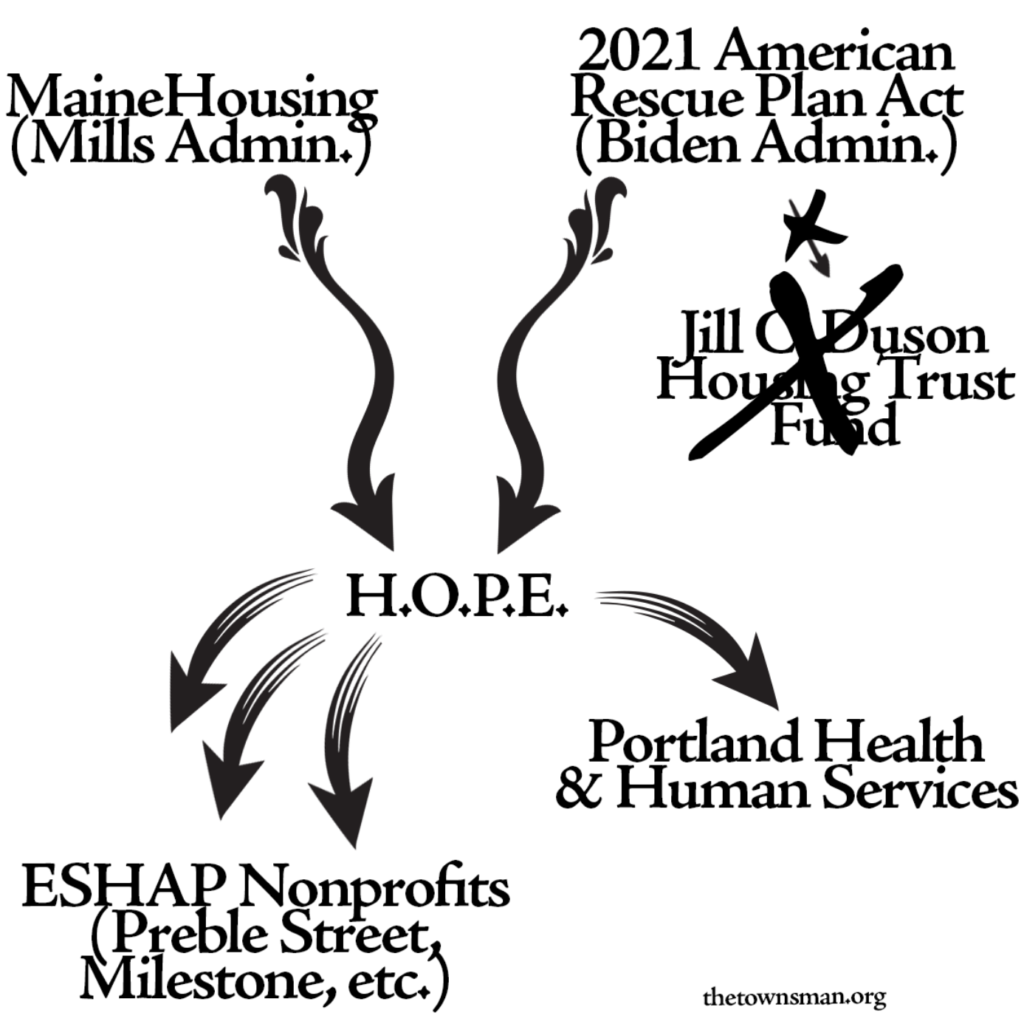This Monday, February 5th, the Portland City Council will debate and vote on the proposed “Housing Opportunities for People in Encampments” (or “H.O.P.E.”) program. This would be a new vehicle for paying dedicated relief workers to find and subsidize private housing arrangements for those homeless individuals who are still living in tents around the city. This new program would take the form of a partnership with the statewide housing authority MaineHousing, and the city’s share of the costs (approximately $229,000) would be taken from funds for the Jill C. Duson fund for affordable housing construction.
While hailed as “innovative” by the city’s own press release, details surrounding the plan have been sparse; factors such as the concept’s origin or the structure of expenditures remain unknown to the public. Adding to the mysterious character of the plan, the city’s administration has requested that this program’s founding ordinances, Orders 115 and 116, be passed with emergency authority. This maneuver, if supported by a supermajority of seven voting members, would bypass the need for the orders to be read across two meetings, and the program could commence immediately. No rationale was provided by the city as to why this emergency measure was necessary.
The program, while doubtlessly oriented towards the important goal of housing Portland’s most needy residents, has raised concerns among City Councilors and the public for its opacity, haste, and arguable lack of prudence in an era of harrowing budget shortfalls. Is it right for money earmarked for the construction of housing to be, instead, spent to buy up that housing which already exists? When doubts swirl, it must be asked – what are the facts? To judge the merit of this program, the context and anticipated outcomes have to be understood.
Background – Who’s Who?
When discussing the fraught network of governmental, quasi-governmental, and private entities which entangle the world of affordable housing, the names and acronyms casually thrown around can seem daunting to the casual observer, (this, it must be assumed, is sometimes intentional.) But there’s no reason to be discouraged, what follows is a brief survey of the relevant characters.
The American Rescue Plan Act (ARPA) was a $1.9 trillion stimulus package passed by the United States Congress and signed by President Joe Biden in 2021. Of these 1,900,000,000,000 dollars, $350 billion were directed to local and state governments to recover from pandemic-era budget troubles, including Portland. Of this, at the center of this discussion is the $5.11 million which Portland earmarked for the Jill C. Duson Housing Trust Fund.
The Jill C. Duson Housing Trust Fund (HTF) is a reserve of money maintained by the City of Portland for the “retention and creation of an adequate supply of housing, particularly affordable housing, for all economic groups,” according to Chapter 14 of the City Code which establishes it. This fund is used to subsidize the building of affordable housing across Portland, and has played a key role in manifesting much of the construction which happens in the city. Money is raised by the fund from a variety of sources, including fees paid by developers who opt to forego the “inclusionary zoning” requirements for new multi-family buildings. On August 1st, 2023, the balance of the fund was approximately $4.3 million.
MaineHousing is the statewide housing authority based in Augusta. This independent arm of state housing policy raises funds from a mixture of sources, at both the state and federal level, and spends money on a wide variety of projects intended to create new housing, maintain existing stock, and assist homeless persons with accessing housing and shelter, among other things.
Nonprofit organizations, commonly known as “nonprofits”, are private groups which do not produce a profit for shareholders. Like other corporate entities, nonprofits are typically governed by boards of directors and executive officers, and staffed by salaried employees, but unlike Walmart or Apple, all money raised is spent towards the achievement of the organization’s goals, with no margin of profit reserved for owners. Nonprofits which are heavily involved with homelessness in Portland include Preble Street, a multi-armed resource for persons in need, Milestone, a group which helps men with substance abuse problems, and Commonspace, which helps women who’ve struggled with chronic homelessness.
H.O.P.E.
In response to the unprecedented expansion of homeless encampments in 2023, the City of Portland formed the Encampment Crisis Response Team. The ECRT facilitated the voluntary relocation of homeless persons from these camps to available shelter, ahead of city- or state-mandated clearances. After months of playing whack-a-mole, the city can be proud that no major encampments remain, and only individual or small groups of tents are unobtrusively persisting around town. With the purpose of the ECRT no longer current, a new program was thought to be necessary.
A Great Rush for Not Much (Detail)
On January 31st, 2024, a press release from the city entitled “City Continues to Respond Innovatively to Shelter and Stably House People” announced the intention of the City Council to review and vote on a new program, “Housing Opportunities for People in Encampments,” or “H.O.P.E.”
Despite the confidence of the press release’s title, and optimistic quotations from City Manager West and MaineHousing Director Daniel Brennan, it was evident that many questions remained unanswered. The identity of exactly who in city or state government had conceived of the plan, which City Councilors would support it, and details about how the program would actually function were still all mysteries. What’s more, the City Council was being asked by the Manager to pass this immediately, as an emergency, meaning the council and public would have only one meeting to consider their options. No justification for this rush was offered.
While typically more detailed information is provided to the public through the council’s agenda portal, in this case there’s no such luck. The council’s memorandum contains only more specific figures than those offered in the press release, and despite the memo promising “Additional program details are provided in the enclosed documents,” no such additional details are in fact enclosed. What is included in the proposed order, however, is the usual broad authority for the City Manager to “execute any and all documents necessary” to carry out the order. Whether this represents a pragmatic flexibility or a last-minute rush cannot be determined.
The Program
Nevertheless, despite the deficiency in detail and the brief window offered for the public to digest the plan, the program can be reasonably outlined. As with any government program, it can be broken down into its intent, its methods, and its funding.
1 – Intent
As no major encampments remain, those dozens of Portlanders who continue to sleep in tents and other outdoor arrangements represent some of the most shelter-resistant of the homeless population. While the Homeless Services Center (the newly-built shelter in Riverside) has relaxed or adjusted many of its standards so as to better serve Portland’s homeless population, such as allowing for more flexible curfew hours and providing storage facilities, the requirements of shelter living will always be a deterrent for some campers. Besides, for those in the encampments who intend to live in the Portland area long-term, shelter is only ever a temporary state – permanent housing is thought to be preferable for most people.
With this in mind, the H.O.P.E. program is designed to help campers find, purchase, and afford housing. For those homeless who, for whatever reason, struggle with discovering and talking to landlords, the program would aim to ease this communication. For those who cannot afford the high rent prices and other costs which Portlanders face in this housing shortage, the program would aim to ameliorate these monetary burdens.
The program’s overarching goal is to place at least 45 people currently living in encampments in permanent housing.
2 – Methods
While many of the details remain unclear, the information which has been provided to the City Council does explicate the basic structure this program will take, and what actions it will pursue. The first action of the program would be to fund the employment of four new staff members.
The new staff members would consist of three “housing navigators” and one “landlord liaison.” That latter coordinator, charged with communicating and making financial arrangements with local landlords, would work directly for the City of Portland – but the other three would not. Rather, these navigators would work for one of the private nonprofits (it is not yet known which) that the city relies on for homeless services. The public program would directly pay these nonprofits to provide salaries for these workers, who would in turn report to the nonprofits. No salary information has been provided, so it is unclear what portion of the ARPA funds these will consume. The nonprofit(s), though not specified, would need to be associated with MaineHousing’s ESHAP shelter program, limiting the number of candidates to a select few groups.
Together, these four staff members would use the program’s funds to place as many campers into permanent housing as reasonably possible. For example, the navigators would search for market-available housing which campers could move into, and they would then directly offer money to such landlords to incentivize them in choosing a camper as a tenant. The staff may also use funds to ease the process of moving in to such units, or otherwise relieve the monetary costs which face campers willing to move into housing.
A full picture of what sort of actions the program’s staff would be authorized to make, (and conversely, what they’d be barred from spending money on,) has not been provided to the council at time of publication, nor has any indication of what the priority for funds would be.
3 – Funding
As a partnership between the City of Portland and MaineHousing, the costs of H.O.P.E. are being split between the two. Portland would be obligated to pay $229,385 into the program, and MaineHousing would pay $465,722 into the program; this brings the combined war chest to a total of $695,107. If the program succeeds in housing its goal of 45 campers, this means the program would spend $15,446 for each homeless person helped.

Update 2/5/2024: Portland Director of Communications Jessica Grondin would like readers to note that while the goal is to house 45 people among those in encampments, that the program would intend to “serve 90 people through housing navigation assistance delivered at encampments.”
However, with major budget shortfalls and serious tax hikes looming over the city, the Portland’s general fund would be hard-pressed to support further expansions in social services. The city’s Health and Human Services department has already recently hired two other staff members for its “Overdose to Action” program, focused on preserving the life and safety of Portland’s unsheltered homeless population. All signs point, too, towards a renewed increase in the migrant population as winter recedes, and as the number of persons claiming asylum at the southern border and elsewhere remains high. The costs of housing and caring for these asylum claimants, thousands of which arrived in Portland last year, was the single greatest catalyst for the spike in social services spending in the city over the past 13 months.
With these restrictions in mind, city staff have recommended an alternative source of money: the 2021 American Rescue Plan Act (ARPA) funds from the Biden Administration. Effective August 1st, 2023, the City Council voted to allocate $5.1 million from Washington to the Jill C. Duson Housing Trust Fund (HTF) to subsidize the construction and expansion of affordable housing units. While this designation has already been made, city staff has concluded that at least some of this money can be re-appropriated towards another destination, as if this were the intention of the council from the beginning.

This is an important technical point. While the functional balance of the HTF will be decreased, and the H.O.P.E. program’s coffers increased by an equal amount, legally speaking, this is not taking money from the HTF. Rather, it is redirecting funds which had previously been directed towards the fund. By understanding the funding process this way, the city is under no obligation to adhere to the HTF’s rules for spending the HTF’s money. As H.O.P.E. is completely unrelated to the process of building, maintaining, or expanding affordable housing units, focused instead on facilitating the purchase of units for the currently homeless, it is doubtful whether the program would meet the HTF’s stated purposes.
Innovation, or Misappropriation?
Approached for comment, newly-elected Councilor Sykes of District 5 offered an overview of her skepticism to the Townsman. While not denying the need for supportive housing services, she “question[s] whether the HTF is the appropriate source for this funding” of it. “[T]he fund is intended to create housing, not rent it from the private market.” She went on to explain that the HTF’s guidelines for disbursement demand a competitive process, and through this process “there are currently developers waiting to considered for these funds[.]” Far from being motivated solely by cost-cutting fiscal conservatism, she renewed her call for Portland to establish a social housing developer to meet these needs in supply-positive fashion.

Councilor Sykes, while the only councilor to respond in detail to the Townsman’s request, is far from the only one to raise concerns about the plan. Criticisms fall primarily on three pillars of this program – the dangers of demand subsidies, creeping privatization, and the windfall nature of ARPA funds.
Subsidizing Demand – Robbing Peter to Pay Paul?
As MaineHousing itself concluded, the housing affordability crisis in Maine is directly downstream of the major housing shortage in southern Maine, especially the Greater Portland area. With too much demand for not enough supply, prices are naturally sent skyward. While private pro-housing construction advocates wrestle with entrenched opponents of significant development, public resources like the HTF have become important rallying points for alternative visions of housing construction. To alleviate a supply crisis, supply has to be addressed, and the Duson Fund has been explicitly funded and directed for the construction of affordable housing. This is, in other words, subsidizing supply.
However, this can be a frustratingly indirect method of alleviating the immediate pains of those most in need today. People who cannot afford housing now are not helped by new units coming on the market in two to four years. So, governments also offer them direct aid for the purchase of housing. This is called subsidizing demand.
In a market with adequate supply, these two purposes need not be in conflict. But when there is a strictly limited number of units on the market, bidding wars break out for those few units which become available. In such circumstances, subsidizing demand has the potential to simply further drive up prices while doing little for those most in need.

Is Portland in such circumstances? The city has seen all-time low vacancy rates over the past several years, with fewer units available to lease than ever. But this alone does not prove that subsidizing demand has become untenable – and it still may be necessary to avoid great pains. Nevertheless, robbing Peter to pay Paul is rarely advisable, and in this case we see a demand subsidy (H.O.P.E.) taking funds away from a supply subsidy (HTF) in a harsh supply crunch.
Privatization by Nonprofits?
Of the new staff who this program would hire, just one person would be under the direct employ and supervision of the city government. The other three-quarters of the salary money would be going to private groups (select nonprofits associated with MaineHousing’s ESHAP program) to pay for subcontracted payroll. Should public money be going towards these private groups in such proportions?
The idea of “offshoring” government functions to private corporations is deeply unpopular in Maine, of course, but skepticism for nonprofit groups is much less apparent. Indeed, the city relies on a web of nonprofits for some of its most crucial faculties, and yet this is rarely remarked upon as a form of privatization. Still, criticism has begun to bubble to the surface.
Nonprofits which partner with Portland are certainly not malicious entities, and any call to divest entirely from private groups would be as unjustified as it would be impractical. But the interests of the city as a whole and the interests of nonprofits are rarely perfectly in sync. It may be that the prudent thing to do in the long-run is for the city to take more functions under its own roof.
One-Time Funding for an Ongoing Problem?
The city’s share of H.O.P.E.’s funding comes entirely from the federal funds which the city received through ARPA, but these funds will never come again. That one-time windfall in response to COVID-related budget woes was just that: one-time. Yet the purpose to which the money would be put, helping homeless Portlanders to find permanent housing, will surely still be a pressing one a year from now. What will happen then?
The program could be rolled up, of course, but this would mean laying off four people and cutting off a source of support that some homeless individuals may have come to rely on. But if it’s not rolled up, then where will the money come from? Will this be yet another item on an ever-increasing bill for social services?
It may be that one-time funds are best spent on intrinsically limited projects. A building only needs to be built once, a park can be overhauled in one great effort, technical systems could be given modernizing upgrades, etc. But human resources, for human problems, are a permanent asset and a permanent cost. Putting those who have already experienced such turmoil through more uncertainty in the city’s bureaucracy could prove to do more harm than good.
A City of H.O.P.E.?
Do these concerns rise to the level that this important measure should be blocked? The answer may well be “no.” While the skepticism of Councilor Sykes and those like her may raise one’s eyebrow, the cost here is relatively small at the governmental scale. The city’s ~$250k obligation is only about 5% of the tranche of federal funds which were earmarked for the HTF. The bulk of the money will remain available for building new homes for people.
But as anyone familiar with the law knows, precedents can be life and death. If the HTF begins to be seen as a new source for programmatic funding, at a time when the city’s main sources are so strained, it may not be long for this world. The Duson Fund is an uncommon and powerful tool for fighting shortages with construction, and discounting it in favor of demand subsidies may prove to be a painful first step down a dangerous path.
And perhaps most puzzling at all – why the rush? A program like this would usually receive significant scrutiny from the City Council and the public, possibly even undergoing a workshop process or community outreach. Yet Manager West has slated this program to be fast-tracked, with emergency powers, into immediate existence. The public will not even have the two-meeting forewarning which it is usually offered. Should this sort of treatment not at least be publicly explained?
Many, many questions remain unanswered. If the Council agrees to enact this program at the speed which the city requests, we will all experience together what this program ultimately becomes; no detailed blueprint has yet been laid.
Ashley D. Keenan – Ashley is an editor of the Portland Townsman, with work focusing on the mechanics of local government and housing policy, and also a member of Portland’s Historic Preservation Board. You can reach Ashley personally at ashley@donnellykeenan.com



Thanks for this, Ashley. As usual, you have presented a thorough analysis of a complicated policy initiative; and this one clearly deserves much more time and detail than it seems that the City Manager is offering. It will be interesting to see how individual Councillors respond, especially those with well known public positions on homelessness and encampments.
Was this the exact same process/rationale the council followed when they reallocated monies from the JDHTF to Electrify Everything, Quality Housing Coalition, and other councilor-chosen nonprofits about a year ago?